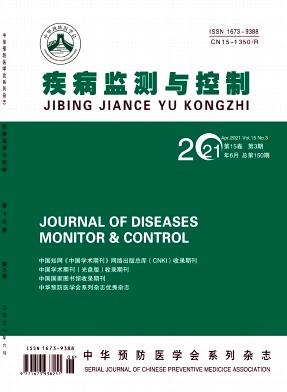A Retrospective Assessment of Syphilis Seroprevalence among Pregnant Women, Cape Coast, Ghana
引用次数: 1
Abstract
This is a hospital-based cohort study, which aimed at assessing the seroprevalence of syphilis among pregnant women who sought antenatal care at the Cape Coast Metropolitan Hospital (CCMH). We retrospectively analyzed secondary data of 2,640 term pregnant women, who gave birth from January, 2016 to December, 2018. Data was compiled from the CCMH delivery register. Out of the 2,640 pregnant women who delivered from 2016 through 2018, 107 [4.1%, 95% CI: 3.3 – 4.8] tested reactive (2016, 1.5%, 40/2640; 2017, 1.0%, 26/2640; 2018, 1.6%, 41/2640). Seroprevalence among the primagravida (those with first pregnancy) was 0.8%, while that among the multigravida (≥ 2 pregnancies) was 3.3% ( χ 2 = 37.562, p = 0.021). Pregnant women within the age group of 22-31 years were the most reactive, 2.3% (60/2640), followed by 32-41 years, 1.1% (30/2640). A prevalence of 1.9% (50/2640) was recorded among Junior High School holders, while 0.2% (5/2640) was found among those who have attained tertiary level education. A Relatively high prevalence of 3.0% (78/2640) was recorded among informal workers compared to the unemployed, 0.9% (23/2640). An appreciable proportion of 18.9% (499/2640) had no syphilis testing record indicated in the register. Early detection of syphilis and treatment of infected partners, rapid testing for ANC non-attendants at the maternity/obstetrics and gynecology departments is highly recommended either before or after delivery, as laboratory services may not be available in the nights when most deliveries occur.加纳海岸角孕妇梅毒血清阳性率的回顾性评估
这是一项以医院为基础的队列研究,旨在评估在海岸角大都会医院(CCMH)寻求产前护理的孕妇中梅毒的血清患病率。我们回顾性分析了2016年1月至2018年12月分娩的2640名足月孕妇的次要资料。数据来自CCMH交付登记册。在2016年至2018年分娩的2640名孕妇中,107名[4.1%,95% CI: 3.3 - 4.8]检测出反应性(2016年,1.5%,40/2640;2017, 1.0%, 26/2640;2018, 1.6%, 41/2640)。初孕妇女(首次妊娠)血清阳性率为0.8%,多孕妇女(≥2次妊娠)血清阳性率为3.3% (χ 2 = 37.562, p = 0.021)。22 ~ 31岁孕妇反应最活跃,为2.3%(60/2640),32 ~ 41岁次之,为1.1%(30/2640)。在初中学历的人中,患病率为1.9%(50/2640),而在接受过高等教育的人中,患病率为0.2%(5/2640)。与失业者0.9%(23/2640)相比,非正式工人的患病率相对较高,为3.0%(78/2640)。有相当比例的18.9%(499/2640)没有登记的梅毒检测记录。强烈建议在分娩之前或之后在产科/产科和妇科进行梅毒的早期检测和对感染伴侣的治疗,以及对非护理人员的ANC进行快速检测,因为大多数分娩发生的夜晚可能无法提供实验室服务。
本文章由计算机程序翻译,如有差异,请以英文原文为准。
求助全文
约1分钟内获得全文
求助全文
来源期刊
自引率
0.00%
发文量
5934
期刊介绍:
"Journal of Diseases Monitor and Control" was founded in 2007 and is a series of journals of the Chinese Association of Preventive Medicine. It was initially sponsored by the People's Hospital Affiliated to Inner Mongolia Medical University. In 2018, it was officially changed to Inner Mongolia Medical University with the approval of the Central Propaganda Department. It highlights the characteristics of "monitoring" and "control", focusing on the fields of preventive medicine, public health, epidemiology, etc., while taking clinical medicine into consideration. It publishes advanced theories, technical methods, measures and experiences in all the above aspects.

 求助内容:
求助内容: 应助结果提醒方式:
应助结果提醒方式:


